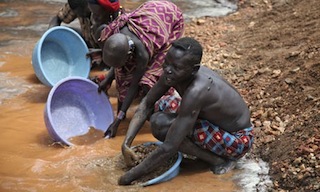South Sudan loses over $200m a year from gold smuggling
July 29, 2013 (JUBA) – South Sudan has been losing an estimated $200 million a year in illegal gold mining, according to an official from the ministry of petroleum and mining.

“In fact we did a rough calculation that if this was to have been organised, I am sure we would have got in total say every year like $600 million from this additional just local miners and applying taxation rate of about 33% internationally we would have gotten about $200 million on average,” Okwang told Sudan Tribune in an exclusive interview.
South Sudan is endowed with many resources and the director stated that the virgin land is yet to see a lot of discoveries in the mineral sector.
Among the minerals that are said to be in the country include gold, copper, uranium manganese and marble among others.
Officials from the ministry revealed that there is illegal mining ongoing in greater Kapoeta of Eastern Equatoria, Udabi of Morobo county in Central Equatoria and Pachalla of Upper Nile state.
Okwang called on citizens not to illegally mine the minerals saying the extraction should be organised for the interest of the citizens at large other than for the benefit of a few.
He warned that they will soon deploy inspectors along with police to suspected areas so as to deal with the illegal miners as the country looks for an alternative to oil, which provides over 90% of the governments revenue.
Landlocked South Sudan is currently in a dispute with Sudan, with it seceded from in 2011, with both sides accusing the other of backing hostile rebel groups. Khartoum recently threatened to close permanently the pipelines that carry South Sudanese crude to international markets via its port on the Red Sea.
Juba is considering building an alternative pipeline to the Kenyan or Djibouti coast but its completion is some years away. From January 2012 until April this year disputes over transit fees and other post-secession issues meant that no oil was exported.
The undersecretary of petroleum and mining ministry, Machar Aciek Ader, said that the South Sudanese government is working to diversify the young country’s economy, which is dependent on oil.
“Since the economy of this country has been dependent on oil, it has been a decision of this government to have alternative sources of finance,” he said.
He promised that in two years time, the economy of the country will not be dependent on oil.
(ST)
